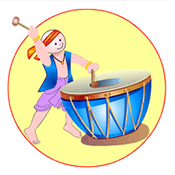
Dimdima
Online Children's Magazine from India

Dimdima
Online Children's Magazine from India
| The New Spirit of India |
|
Henry W. Nevison, the correspondent of the Manchester Guardian toured India in
1907-8. In his writings Nevison captured the new spirit of India as seen by
him. |
“…Swadeshi is now so strong that it would probably hold its own even if all
political grievances were removed. But its true origin was political, and
hitherto it has been impossible to separate it from its political motive—the
protest against the Partition of Bengal.
In any case, it was the political motive which spread the Swadeshi vow like a
beacon light through Eastern Bengal. In towns and villages young men formed
themselves into associations to preach Swadeshi and the boycott. Shops that
continued the sale of foreign goods were surrounded by youths who implored
customers for the sake of their country to depart without purchasing. Boys threw
themselves prostrate in supplication before the customers' feet. This form of
picketing was never violent, and I think it was not often prosecuted. It is true
the officials regarded it with disfavour, and at Barisal Sir Bampfylde Fuller
personally compelled the leading men of the town to withdraw a Swadeshi appeal
they were issuing to the villages (November 16, 1905), and through the District
Magistrate and Police he broke up a Provincial Conference which was being held
in the same town (April 15, 1906).
But in some places the boycott took the form of destroying British goods,
especially "Liverpool salt," and the goods were not always paid for first, In
one case, four youths, destroyed foreign sugar, valued at 1s. 2d., and were
sentenced to three and four months imprisonment, with heavy fines. As is usual
when political offences are savegely punished, the victims triumphed as heroes
in the popular mind…”
Of course, some one has to pay for Swadeshi, and it is not always the British
merchant who suffers for Lord Curzon's error. Late one night, as I sat on a
river steamer after two crowded days in a strongly Swadeshi town, five or six
dark forms were dimly seen to gather round me with gestures of secrecy and
peril. In other countries I should have thought them asssassins thirsting for
blood, but they were only Hindu merchants with an interest in Manchester
piece-goods. Of these they had a large store, I have forgotten how many thousand
pounds' worth, laid up in their warehouses; and, in consequence, they were
shunned by their kind. Barbers would not shave them, milkmen would not bring
them milk, friends would not come to their daughters' marraiges, acquaintances
would not say good-morning. Such treatment was distressing and inconvenient.
Would I please use my influence with the Home Government, and set everything
right again? They refused to throw in their lot with the swadeshi movement;
their goods were too valuable to be sacrificed, and they preferred to stand and
die as martyrs in the cause of British commerce. I had no doubt their statement
was true, but what hope could I hold out to them? —I, who had no influence with
the Home Government, and, if I had been an Indian, would have done my utmost to
dissuade my conuntrymen from buying any foreign goods at till all grievances had
been redressed.
Dimdima is the Sanskrit word for ‘drumbeat’. In olden days, victory in battle was heralded by the beat of drums or any important news to be conveyed to the people used to be accompanied with drumbeats.
Bharatiya Vidya Bhavan
K. M Munshi Marg,
Chowpatty, Mumbai - 400 007
email : editor@dimdima.com
Bharatiya Vidya Bhavan
505, Sane Guruji Marg,
Tardeo, Mumbai - 400 034
email : promo@dimdima.com
Dimdima.com, the Children's Website of Bharatiya Vidya Bhavan launched in 2000 and came out with a Printed version of Dimdima Magazine in 2004. At present the Printed Version have more than 35,000 subscribers from India and Abroad.